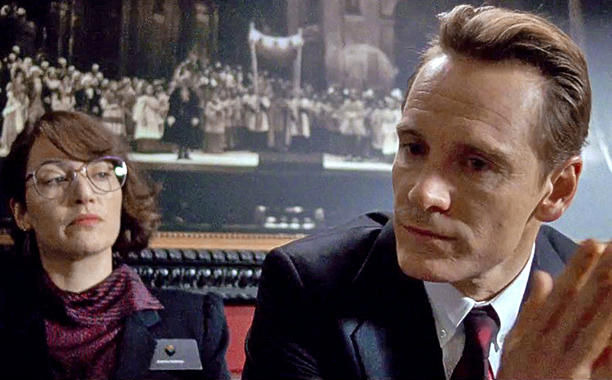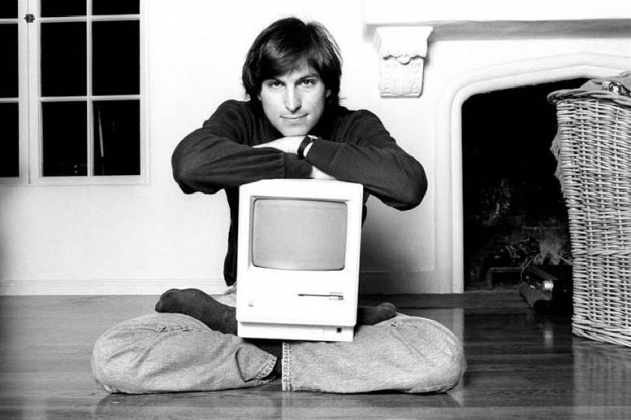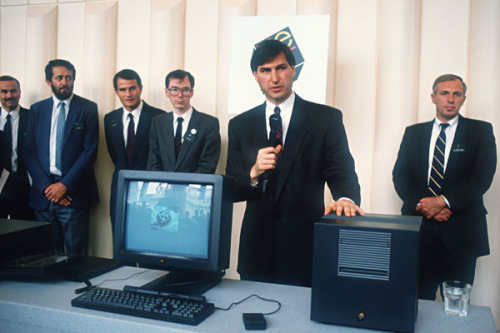
We can all be forgiven for having Steve Jobs fatigue: in the last five years, five movies about the CEO-enfant terrible have appeared. The ambivalent global rending of garments and gnashing of teeth when he died lays bare the Jobs contradiction: we want to know more about him but fear the answer.
STEVE JOBS, by screenwriter, producer and playwright Aaron Sorkin, and directed by Danny Boyle, is, in the words of a 12-year old kid I know who watched it said, “a three-part story: he [Jobs] was a young asshole, a middle-aged asshole and then he was an old asshole.” True–and children do see things like hypocrisy and unfairness with particular acuteness–but Sorkin’s film actually goes beyond this with a lot of details and familiarity with insider stories the other Jobs’ films missed. While the film is structured around three product launches (the Mac, the NeXT cube, the iMac G3), this narrative form is not as dull as it may sound since the launches incorporate many important technical and marketing decisions that shaped Apple and computing generally for decades to come. It also mirrors three great stages in Jobs’s life: his ‘first-born,’ the Macintosh; his expulsion from Apple and the wilderness years at NeXT; and his triumphant return—Cincinnatus-like—to lead Apple back to glory in 1997. And, of course, there are plenty of fireworks behind stage where the multiple threads of Jobs’s personal and work life mingle, like surreal dreams watching each other narrowly, against a drumbeat of intense salesmanship, rage, and bullying.

Michael Fassbender, who plays Jobs, is an inspired casting choice. Although he looks less like Jobs than Ashton Kutcher did in JOBS (2013), he brings depth, complexity and genuine credibility to the role. There are the epic rage-fests of course, and the ones involving his daughter, Lisa, are particular cringe-worthy. But this is probably the best and most accurate portrayal of Jobs and the relevant history in a major motion picture to date. Fassbender is like a hurricane, in other words, a great Jobs, pulling the audience along into his “reality distortion field,” for good or bad. Like a carnival act with throwing knives, we cannot look away.
Joanna Hoffman, Apple’s marketing chief but also Jobs’s fixer, conscience, and counterweight to his outbursts for an astonishing 19 years, is played brilliantly by Kate Winslet. She is a human flywheel, providing stability, attuned to Jobs’s emotional extremes and keeping his anger inside the Apple family (by keeping others away from his blast radius at crucial times), and executing on his seemingly endless commands. But she was not a pushover. Hoffman, for example, ridiculed Jobs for his claim of Apple being able to sell one million Macintosh computers in the first 90 days (they sold 25,000—in one of those months, they sold 500).
In a recent interview, Hoffman, who worked with Winslet during the making of the film, noted, “What was important to me was that [the Jobs filmmakers] conveyed the tone of my working relationship with Steve... Originally, the character was much more subordinate. I’ve never been anyone’s work wife. And if I could impart that on to [Winslet], she would be an ally in that.”

The backstory to the Mac product launch (1984, and the first of the three launches) is the phenomenal success of the Apple II personal computer, the 1977 color computer for the home and school that transformed Apple into a giant and highly-profitable company. Steve Wozniak, played surprisingly well by the (usually stoned) Seth Rogen, brings this theme up in a number of places, first asking for Jobs to publically recognize the Apple II team at the Mac launch (1984), which Jobs refuses to do. Wozniak brings it up years later at the San Francisco Opera House, where, in 1998, the NeXT cube product launch is starting later that day. In a public shouting match in front of mesmerized stagehands and PR people, Wozniak and Jobs argue until Jobs tries to settle things down by saying, “It’s OK. I give you a pass for life.” In its haughtiness, it’s right up there with the horrifying Amon Goeth’s, “I pardon you” from Schindler’s List. Wozniak fights back, “Everyone says you’re a genius? What exactly do you do? I don’t need your pass. Your product is going to fail. The Lisa was a failure; the Macintosh was a failure. Acknowledge that something good happened [the Apple II] that you weren’t in the room for.”

This scene didn’t really happen–Wozniak is well-known for his fairness and quiet manner—but the sentiments and factual accuracy behind the scene were true and sincerely-held: a year after the Mac introduction, the Apple II provided 85% of Apple’s revenue. (In total, the Apple II was in production, in various versions, for an amazing 16 years.) We get a glimpse of that very early era in a wonderful ‘hacker’s garage’ scene in which Wozniak extols his inclusion of eight expansion slots in the Apple II.
Trivial? Quite the opposite, since it fostered a massive ecosystem of hundreds of add-on products that, working in a virtuous circle, made the Apple II useful in more applications, thus more attractive to more people, leading to more sales. Wozniak’s ‘open’ Apple II—to which anyone could add functionality—like a MODEM, a disc drive, or a printer, simply by plugging in an expansion card—was the polar opposite of Jobs’s Macintosh, which was not no so much ‘closed’ as hermetically-sealed. Jobs insisted on keeping the customer (and a potential Mac hardware add-on industry) ‘out of the box,’ which he did in the first instance by using highly unusual screws (which no one had screwdrivers for) to hold the case together. In a piece of delicious irony, Sorkin’s film shows a scene before the Macintosh product launch (1984) in which Jobs’s own technical people can’t open the case to fix an urgent problem.
We can see the interweaving of Apple corporate history with great storytelling as well in the well-researched and passionate dialogue between Jobs and Apple CEO John Sculley, played by Sorkin-favorite Jeff Daniels. Although it started as a corporate bromance, ultimately it ends very badly with lots of hurt feelings to go around, an accurate depiction of reality. This is a wonderful film. It has careful and thoughtful writing, obviously a lot of on-the-ground research with many of the principal characters involved, and a brilliant cast.
The Apple story is inherently Shakespearean. Sorkin, Boyle, and their ensemble cast bring this real-life drama of riches, betrayal, jealousy, love, hate, and hope to life.